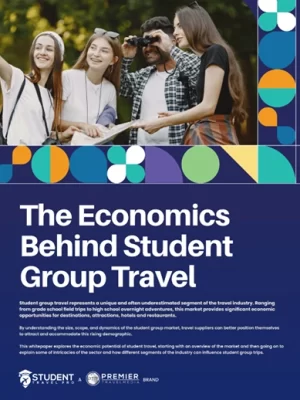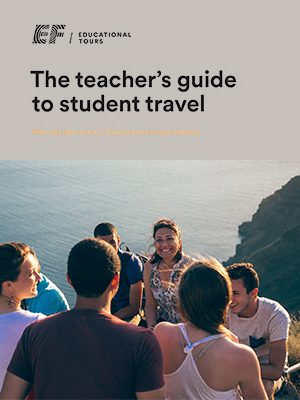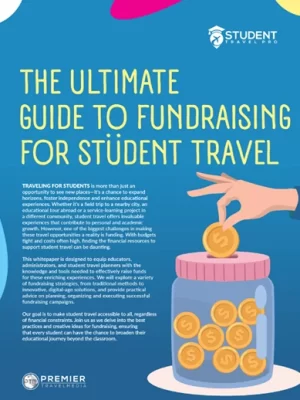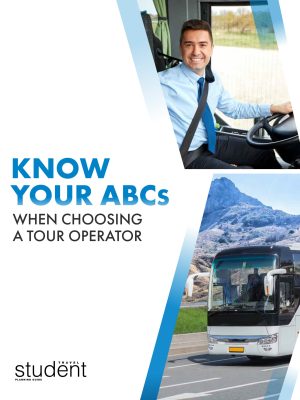Teachers play a vital role in students’ lives. Discover how field trips can bolster relationships between them.
Educational travel is a transformative tool that enriches student-teacher relationships and learning by offering realistic experiences that are engaging, informative and life-changing. This holistic approach to education significantly impacts relationships between students, their peers and teachers and the world around them. It strengthens social bonds and emotional intelligence, inspiring educators to take their teaching to the next level.
Benefits of Student Travel
 The benefits of educational travel go beyond the trip itself. There are five parts to each travel experience and teachers can engage students throughout each one of these phases to strengthen student-teacher relationships:
The benefits of educational travel go beyond the trip itself. There are five parts to each travel experience and teachers can engage students throughout each one of these phases to strengthen student-teacher relationships:
- Anticipation – The planning and anticipation before the trip are not just a prelude but a thrilling and educational team-building experience for teachers and students alike.
- Traveling to the destination – Traveling to and from the destination, often onboard a motorcoach, is another setting where students can learn and bond with their peers and teachers through educational games, videos or presentations.
- The destination – Your field trip destination provides team building, bonding and learning opportunities.
- Traveling home from the destination – Bust out the games and bond on your journey home.
- The memories – After the trip, evaluating the experience and reflecting on the memories provide an additional positive learning aspect of the experience.
How to Build Good Student-Teacher Relationships
Educational travel is a shared journey of learning for both students and teachers, offering numerous benefits. It’s important to note that while travel can enhance student-teacher relationships, it also necessitates careful planning and respect for boundaries to ensure a positive experience for all. But how exactly does one achieve such coveted status with a student? We share how to build a trustworthy and meaningful relationship with your students and why it’s so important.
Informal Interactions Build Trust
Educational field trips allow for more informal interactions, which are not just casual but crucial in building stronger student-teacher relationships based on mutual respect and understanding. Traveling together fosters a sense of camaraderie and allows students and teachers to share new experiences outside the classroom setting. It often provides opportunities for informal, collaborative interactions and conversations beyond academic topics, helping humanize teachers and making them more approachable. Students may feel more comfortable asking questions and seeking guidance when they see teachers in a more relaxed and supportive role.

Travel experiences provide environments and situations where students and teachers can build trust. Students may see teachers as leaders and role models in different contexts, and teachers can gain a deeper appreciation of students’ abilities, personalities, interests and strengths. Educators can act as mentors during travel experiences, guiding students not only academically but also in personal development and decision-making.
For more field trip ideas and opportunities, keep reading from our 2025 Northeast Field Trip Guide.
Become Inspired Together and Strengthen Student-Teacher Relationships
Experiencing new places and cultures can inspire students and teachers alike, leading to a renewed enthusiasm for learning and teaching beyond the traditional classroom. It can encourage students to step out of their comfort zones, boosting their confidence, independence and resilience.
 Hands-on experiences and real-world applications allow students to engage directly with the subject matter and see how concepts they’ve learned in school apply in real-world situations. Activities like archaeological digs, science experiments in nature, or art workshops in cultural hubs enable students to learn by doing, deepening their understanding and retention of information. Interactions with historical sites, cultural landmarks and museums also enhance understanding and retention.
Hands-on experiences and real-world applications allow students to engage directly with the subject matter and see how concepts they’ve learned in school apply in real-world situations. Activities like archaeological digs, science experiments in nature, or art workshops in cultural hubs enable students to learn by doing, deepening their understanding and retention of information. Interactions with historical sites, cultural landmarks and museums also enhance understanding and retention.
Global Travel Brings Students and Teachers Closer
Global travel allows teachers to expose students to diverse cultures, traditions, international perspectives and ways of life, fostering empathy, cross-cultural understanding, open-mindedness and global interconnectedness. Through these experiences, educators can truly appreciate the importance of their role in shaping students’ world perspectives. Experiencing new places and cultures firsthand can spark a lifelong love of learning and exploration and help build strong bonds among peers and educators.
Educators can design activities where students learn to adapt to unfamiliar situations, navigate new cities, and solve problems on the fly, strengthening their critical thinking and problem-solving skills. Working together while traveling encourages teamwork, negotiation and conflict resolution skills, and builds trust, ultimately deepening relationships. Group activities help students collaborate, share insights and learn from each other while also bolstering relationships among peers and educators.

Ways to Deepen the Student Travel Experience
- Encouraging students to keep travel journals or participate in reflection sessions helps them process their experiences, integrate their learning and develop critical reflection skills. It can help students process what they’ve learned and how it applies to their lives and future studies. Traveling can lead to personal reflection and a deeper understanding of oneself as students may discover new interests, passions or career aspirations.
- Instead of traditional tests, teachers can assess students through presentations, reports or creative projects that reflect their learning during the travel experience. Encouraging students to continue exploring topics they encountered during travel promotes lifelong learning and curiosity.
- Travel can integrate multiple subjects, like history, geography, art, and science, into a cohesive learning experience. For example, a visit to an ancient ruin can involve history, archaeology, art, and even chemistry. A trip to a coastal region can also include lessons on marine biology, environmental science and local history.
Teaching through student travel provides a dynamic and immersive approach to education, offering unique experiential learning opportunities beyond the traditional classroom. It also provides a holistic learning experience combining academic growth and personal and social development. Students and teachers alike can be transformed by traveling together.
By Sue Arko – Contributing Writer








